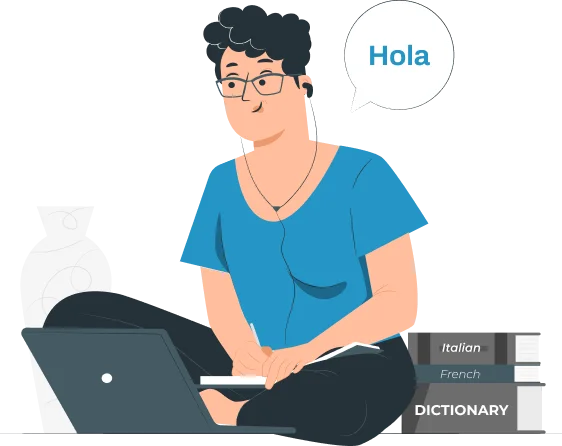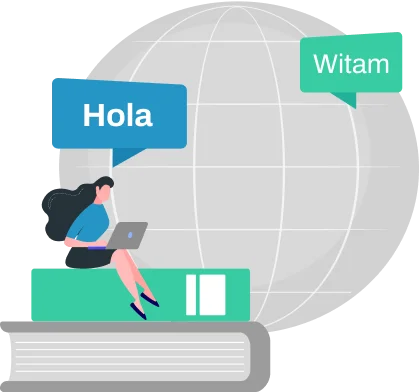Legal documents can have cultural references that need careful attention. Our translators understand these nuances and translate them accurately, avoiding costly mistakes. With experience in diverse legal fields like contracts, intellectual property, and corporate law, our team understands complex legal concepts and delivers the best quality Spanish legal translation services.
Professional Spanish Translation Services
Gain a competitive edge in the Spanish markets with our professional Spanish translation services. Get Free Consultation!Get your quote

Expand Your Reach with Spanish Translation Services
The Spanish population represents a vast and powerful consumer force. With certified Spanish translation services from CCJK, you can scale internationally and reach customers in Mexico, Columbia, Spain, and more.
Our team of native translators delivers accurate, culturally appropriate translations that resonate with your Spanish-speaking audience. It allows your business to increase brand awareness, boost sales, and build trust by communicating clearly in your customers’ local language.
Our clients
World’s top organizations rely on CCJK
Build Trust with Culturally Accurate Spanish Translation
Word-for-word translations can cause misunderstandings and damage your brand reputation. We go beyond the literal translations and capture the original meaning of your message. Our translators are native Spanish speakers with a deep understanding of cultural nuances, which ensures that our Spanish language translation services are precise and accurate.
From humor and idioms to regional variations, our translations speak to Spanish customers. We help you build lasting relationships and build your credibility as a reliable brand by communicating with confidence in Spain.

Get a Free Spanish Translation Consultation

Native Spanish-Speaking Translators
At CCJK, we help our clients effectively communicate with their Spanish customers. Our native Spanish translators are experts in the source and target languages and also have an understanding of your specific field. It allows them to translate technical terminology accurately, capture the tone and style of your industry, and deliver premium quality content. Whether you’re in engineering, marketing, finance, or healthcare, our translators remove the language barrier and guarantee your message is impactful and tailored to your business needs.
We Translate All Types of Content into Spanish
We have the right resources to provide Spanish document translation services for any sector. Our team has the expertise to manage any project, big or small. We ensure clear and consistent messaging across all your Spanish communications for maximum impact.
We are a full-service Spanish translation agency that adapts your game’s content for the Spanish market, considering all cultural nuances, regional references, and humor to enhance player experience. From menus and subtitles to in-game dialogue and other user-facing elements, our team has the technical know-how to handle all aspects of game localization smoothly. Get a free initial consultation and get top-notch Spanish to English translation services at affordable rates.
Medical documents must comply with local regulations in each country. Our translators stay updated on healthcare policies so that your translations meet compliance requirements for the target market. We follow best practices to deliver accurate Spanish medical translation services, even for the most complex healthcare documents.
We have translators with backgrounds in engineering, IT, manufacturing, and various other technical fields that ensure precise technical Spanish translation services. They carefully translate technical documents, user manuals, software interfaces, and engineering specifications, maintaining the accuracy and clarity of the original text.
Personalized Pricing to Match Your Project’s Needs
Get Onsite & Virtual Spanish Interpreting Services
CCJK is your one-stop service provider for certified Spanish interpreter services. We have a network of native professionals with extensive experience in various fields. It guarantees accurate interpretations with industry-specific expertise for clear communication.
We adapt to your needs, whether you require an interpreter for an onsite event or a virtual conference. Our services include simultaneous, consecutive, and sign language interpretations in all settings.

Why is CCJK Trusted by Leading Brands Globally?
Leading organizations around the world trust CCJK for certified English to Spanish translation services. We focus on strict quality control measures and meet deadlines to confirm efficient translation. Whether you want Spanish website translation services or Spanish subtitling services, CCJK is your reliable Spanish translation company for comprehensive translation solutions.

Advanced QA Measures
Every project goes through a detailed review by multiple qualified linguists and editors. Our team carefully checks the translations for cultural relevance and accuracy to deliver a polished final result.

Industry-Specific Knowledge
Your technical documents, marketing materials, or software interfaces are translated by experts with years of field experience. It leads to consistent communication tailored to your industry’s needs.

Timely Delivery
We use efficient project management processes that optimize workflow and minimize delays. Our clear communication and well-defined timelines keep everyone informed and focused on meeting deadlines.

Affordable Pricing
Through careful market research, our pricing remains competitive while reflecting the expertise and value we deliver. You’ll receive a detailed quote with custom translation pricing before moving forward.
Get Your Affordable Translation Quote in Minutes
Some Nuances of the Spanish Language
Spanish is the 4th most spoken language in the world. There are around 500 million Spanish native speakers, and about 100 million people speak Spanish as their second language.
| Aspect | Description | Example |
|---|---|---|
Dialects |
Spanish has many regional dialects with variations in vocabulary, pronunciation, and grammar. |
Spain: Castilian Spanish, Andalusian Spanish (southern Spain) Latin America: Mexican Spanish, Colombian Spanish, Argentinian Spanish |
Slang & Idioms |
Spanish slang and idioms add flavor and informality to communication. |
“¿Qué tal?” (How’s it going?) “Estar en la luna” (To be daydreaming) “Llueve a cántaros” (It’s raining cats and dogs) |
Formal vs Informal Registries |
Spanish uses different verb conjugations and vocabulary depending on formality. |
Formal: “Usted come” (You eat) Informal: “Tú comes” (You eat) |
Gender Agreement |
Spanish nouns and adjectives have masculine and feminine forms that must match. |
“El libro rojo”(The red book) “La casa grande”(The big house) |
Double Negatives |
Double negatives are common in Spanish and often used for emphasis. |
“No tengo nada” (I don’t have anything) “No lo sé para nada” (I don’t know it at all) |
Subjunctive Mood |
The subjunctive mood is used to express doubt, possibility, or emotion. |
“Espero que venga” (I hope he comes) “Dudo que sea verdad” (I doubt it’s true) |
False Friends |
Words that look similar to English but have different meanings. |
“Embarazada” (pregnant) “Actualidad” (present time) |
Spanish Case Studies
Meet Our Team of Professional Spanish Linguists

Carlos Jimenez
A seasoned translator from Chile, Carlos has over 15 years of experience in the field. He is a versatile translator comfortable handling various projects, including legal documents, technical manuals, and travel brochures. His meticulous attention to detail and knack for meeting tight deadlines make him a trusted choice for English to Spanish translations.

Valentina Garcia
A native of Cuba, Valentina focuses on translating travel brochures, website content, and marketing materials from Russian to Spanish. With a background in tourism and hospitality, her translations not only capture the essence of destinations but also inspire travelers to explore Spanish-speaking cultures.

Mariana Lopez
Mariana is a translator from Puerto Rico with a degree in fashion design. She specializes in translating fashion websites, product descriptions, and marketing materials from French to Spanish. Mariana’s understanding of fashion trends and cultural nuances ensures her translations are not only accurate but also stylish and appealing to the target audience.

Isabella Vargas
Isabella is a translator from Argentina with a passion for education. She specializes in translating educational materials, children’s books, and teacher resources from Italian to Spanish. Her translations are clear, engaging, and age-appropriate for the target audience.
Client Testimonials
Our mobile app needed localization for Spanish speakers. Team CCJK ensured cultural nuances were considered for a seamless user experience. Recommended!
Angela RichardsonMy restaurant’s menu needed a Spanish translation that felt authentic and inviting. Your prices were great, and the translation brought in new customers. Thanks!
Donald C. ClaytonWe use CCJK’s Spanish translation services regularly for various marketing materials. The translations are consistently high-quality and delivered on time. Satisfied.
Chris AlvarezExpanding into the Spanish market was exciting, but translating product descriptions accurately and in a way that resonated with a new audience was a huge challenge. Your translations were a game-changer! The team clearly understood the importance of clear product descriptions and the ability to evoke a desire to purchase. Sales in the Spanish market skyrocketed after launching with your translated descriptions.
Barry M. DunnMy children's book, filled with playful rhymes was close to my heart. I wanted to ensure the Spanish translation captured the story's rhythm, humor, and overall charm. Your translator beautifully preserved the essence of the book, even the subtle wordplay. Now, Spanish-speaking children can enjoy the story just as much as English readers.
Benjamin DittmerFAQs
frequently asked questions

Do you provide revisions for the translated content?
We prioritize content quality and client satisfaction above anything else. Projects can sometimes require adjustments based on client feedback. Our clients can contact us anytime for translation revisions to meet their goals.
How do you handle confidentiality and data security?
We take proper security measures to keep our client data confidential. All the translators involved are required to sign an NDA before working on your project. We use secure methods to transfer our documents, and only authorized personnel are able to access clients’ files.
How do you maintain language consistency in a large-scale translation project?
In order to effectively manage large-scale projects, we develop a comprehensive style guide with terminology and determine the right tone for the target audience. It reduces the chances of inconsistency and variations throughout the translation project. We also use a centralized TMS to manage people and resources, which confirms that everyone refers to the same resources and project glossaries.
Do you offer industry-specific official Spanish translation services?
Yes, we do offer with more than two decades of language industry experience, our certified Spanish subject matter experts are always ready to provide industry and dialect-specific Spanish document translation services. If you need Spanish translations for medical, legal, or any other industry, feel free to contact us today!
Can I discuss my translation project with someone by phone?
Yes, you can discuss your Spanish translation project related queries with our sales team and project managers on the phone.

